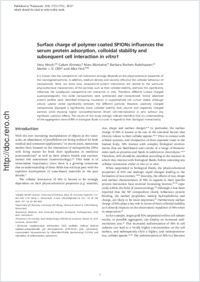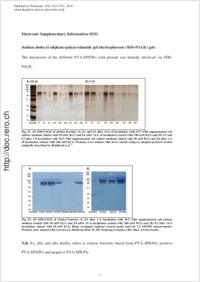Surface charge of polymer coated SPIONs influences the serum protein adsorption, colloidal stability and subsequent cell interaction in vitro
- Hirsch, Vera Adolphe Merkle Institute, University of Fribourg, Switzerland - Department of Chemistry, University of Fribourg, Switzerland
- Kinnear, Calum Adolphe Merkle Institute, University of Fribourg, Switzerland
- Moniatte, Marc Proteomics Core Facility, École Polytechnique Fédérale de Lausanne, Switzerland
- Rothen-Rutishauser, Barbara Adolphe Merkle Institute, University of Fribourg, Switzerland - Respiratory Medicine, Bern University Hospital, Inselspital, Switzerland
- Clift, Martin J. D. Adolphe Merkle Institute, University of Fribourg, Switzerland
- Petri-Fink, Alke Adolphe Merkle Institute, University of Fribourg, Switzerland - Department of Chemistry, University of Fribourg, Switzerland
-
12.11.2012
Published in:
- Nanoscale. - 2013, vol. 5, no. 9, p. 3723-3732
English
It is known that the nanoparticle–cell interaction strongly depends on the physicochemical properties of the investigated particles. In addition, medium density and viscosity influence the colloidal behaviour of nanoparticles. Here, we show how nanoparticle–protein interactions are related to the particular physicochemical characteristics of the particles, such as their colloidal stability, and how this significantly influences the subsequent nanoparticle–cell interaction in vitro. Therefore, different surface charged superparamagnetic iron oxide nanoparticles were synthesized and characterized. Similar adsorbed protein profiles were identified following incubation in supplemented cell culture media, although cellular uptake varied significantly between the different particles. However, positively charged nanoparticles displayed a significantly lower colloidal stability than neutral and negatively charged particles while showing higher non-sedimentation driven cell-internalization in vitro without any significant cytotoxic effects. The results of this study strongly indicate therefore that an understanding of the aggregation state of NPs in biological fluids is crucial in regards to their biological interaction(s).
- Faculty
- Faculté des sciences et de médecine
- Department
- Département de Chimie
- Language
-
- English
- Classification
- Chemistry
- License
-
License undefined
- Identifiers
-
- RERO DOC 31863
- DOI 10.1039/C2NR33134A
- Persistent URL
- https://folia.unifr.ch/unifr/documents/303006
Other files
Statistics
Document views: 106
File downloads:
- pdf: 421
- Supplementary material: 160

